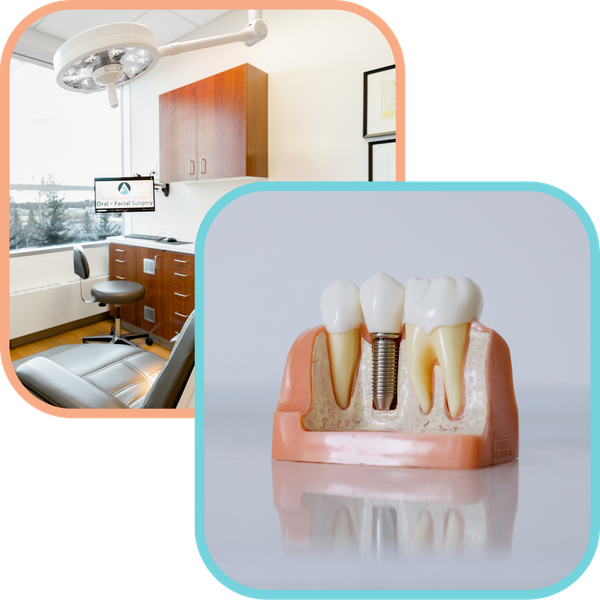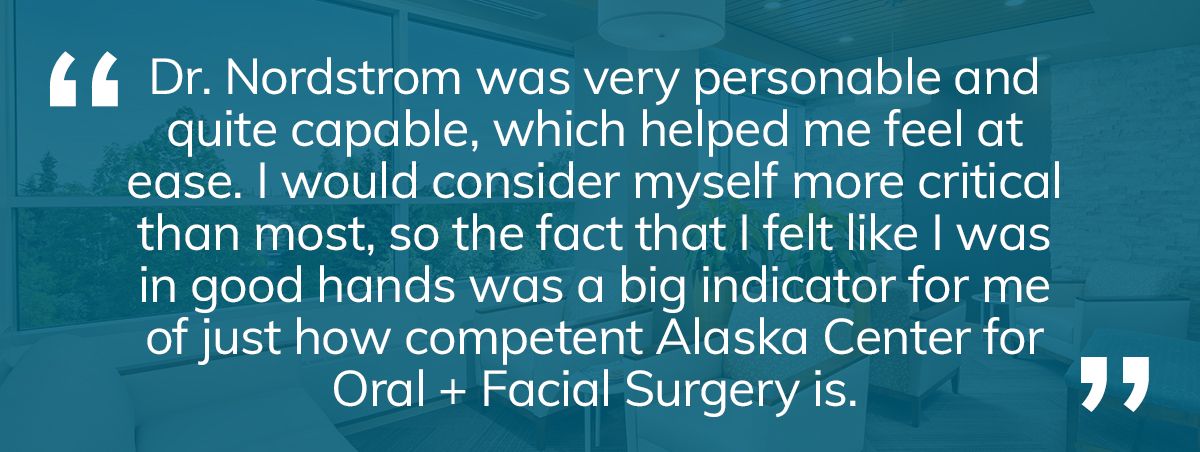Dental Implants
Alaska Center For Oral + Facial Surgery
Alaska's Only AAAHC Accredited Oral & Maxillofacial Surgery Practice


Smile Wider and Brighter With Dental Implants From Alaska Center for Oral + Facial Surgery
Dental implants may be small, but they are not simple, and there are dental implants that can be uncomplicated just as often as they’re complicated. To adequately perform dental implants at a high level, an oral surgeon must understand and be able to provide a skilled treatment for dental implants at all stages.
Planning starts from before tooth extractions occur until there are implants ready to be fitted for the final crown. Dr. Nordstrom is very thorough in treatment planning and discussing plans with patients, and can provide the highest standard of dental implant treatment available. Dr. Nordstrom also has contemporary training in the All on 4 implant treatment procedure, allowing you to have this performed to the national standard at a competitive cost — without patients having to travel to the lower 48.

Two Doctors Highly Trained in Their Fields
By having Dr. Nordstrom involved in your implant treatment, you get a highly skilled surgeon to perform the implant surgery, and your dentist to perform the crown restoration. This also ensures that at least two doctors will be able to evaluate and participate in your care, and each is performing the service for which they are specifically trained.
Going Into Your Dental Implant Procedure
If dental implants are a new experience for you, you are in excellent hands with AOFS. Because we provide patient-centered oral surgery care combined with the most advanced technology and skillful oral surgeons, our positive patient outcomes are undeniable.
The information below is a snapshot of what to expect from our oral surgery clinic upon your dental implant treatment.
First-time dental implant consult
You will have an initial dental implant consultation with one of our oral surgeons, and this may include a mouth examination, taking X-rays or 3D pictures, and discussing your patient treatment plan.
Placement of Your Dental Implants
Following your initial consultation, your next appointment will be placing the dental implant in the space where your tooth is missing. In this appointment, you’ll have a local or IV anesthesia or both to place the implant in your jawbone. While every patient is different, most feel better and experience less discomfort after the dental implant is placed, though after surgery, you may experience bruising, swelling, or bleeding afterward.
Healing
Once the dental implant is placed, you’ll undergo what is referred to as osseointegration, where the bone begins to grow together with your dental implant to strengthen and improve its integrity. Osseointegration requires a few months of healing, but then you are able to go about your normal activities. For the first couple of weeks, you may need to be on a soft foods diet while you’re healing, and then gradually move into regular foods.
Placement of the abutment
Once your dental implant has healed and is bonded with your jawbone, the next step is an abutment. This is a small connector device that is secured right above the gumline. It is important to note that at times the abutment can be placed at the time of the implant — check with your oral surgeon.
New Teeth
Once your gums heal from the abutment, your oral surgeon will work with your general dentist, who will begin crafting your new teeth. The teethare attached to the abutment, and though they can’t decay, it is vital to impart general dental hygiene practices (brushing and flossing) to your new teeth.
A dental implant follow-up
After everything is said and done, you may need to schedule a follow-up appointment with your oral surgeon to ensure your dental implant has healed and to answer any patient questions.
The entire dental implant process can take anywhere from three to nine months.
Success Stories

"A toothache may seem like a simple condition that happens once in a while, but it is extremely frustrating when it happens. There are reasons why this pain exists and there are solutions to it."
— James K.

“My insurance company rejected a few of the charges, but the amazing front desk staff at Alaska Center for Oral + Facial Surgery were tenacious & successful in getting everything paid for in the end. Dr. Nordstrom himself..."
— Darrell V.

“I’ve always had poor teeth. I grew up in a place without fluoridation in the water supply. I feel like I’ve spent my entire life in a dental chair! As an adult, my teeth would crack and then they would have to be extracted..."
— Steve H.
Contact Us Today
Contact our office today for more information on dental implants!
